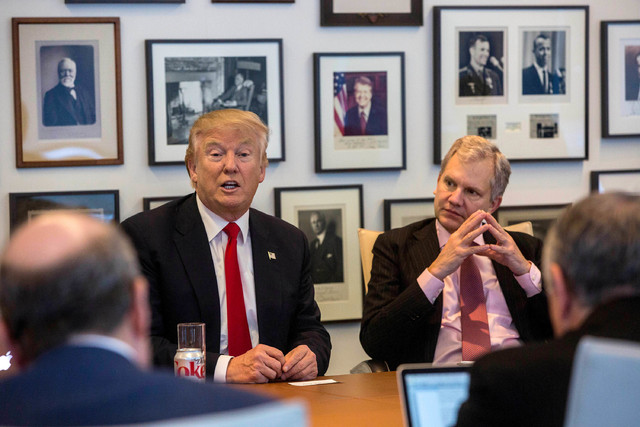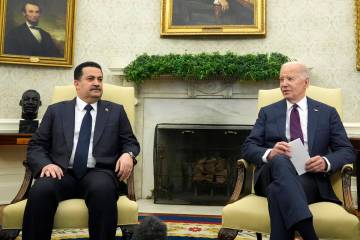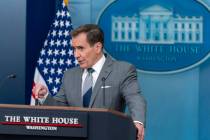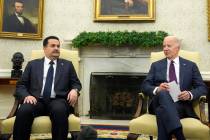New York Times getting new publisher
New York Times publisher Arthur O. Sulzberger Jr., who oversaw the newspaper through triumph and controversy for the past 25 years, will step down at the end of the year and hand the job to his son, Arthur Gregg Sulzberger, the company said Thursday.
The transition was expected at the Times, which has been controlled by members of the Ochs-Sulzberger family since the 1890s. The senior Sulzberger turned 66 in September, one year past the traditional retirement age for top executives at the paper. He will continue to serve as chairman of the parent New York Times Co.
His son - known as A.G. - has been groomed as his successor for several years. He was named deputy publisher in October of last year, all but anointing him as the heir apparent among many candidates within the sprawling extended family.
A.G. Sulzberger, 37, will be the fifth generation of the family to run the Times, which has long been one of the world’s most important and accomplished news organizations.
The younger Sulzberger, a former reporter, is well-liked in the Times’ 1,200-member newsroom. As befitting his family predecessors, he has held positions in various parts of the Times’ operations, including at one point serving as a national correspondent based in Kansas City. He also has been a reporter for the Providence Journal and the Oregonian in Portland.
The generational transition comes at a critical juncture for all news media companies, and for the Times in particular. Intense competition from digital sources and platforms, particularly Facebook, and the erosion of retail advertising continues to wallop profits and revenues among traditional news companies and digital competitors alike.
At the same time, President Donald Trump has engaged in a long campaign to undermine the mainstream media’s credibility, with a special animus toward the Times. He has repeatedly disparaged the paper’s reporting on his campaign and presidential administration and referred to it as “the failing New York Times” on Twitter. His most recent attack was on Monday when he called a Times report that he watches TV four to eight hours a day “bad reporting.”
Many of Trump’s critiques have been inaccurate, such as that the Times “apologized” to him for its campaign coverage after his victory in November. It did not.
Perhaps boosted by Trump’s assaults, the Times’ digital subscription base has surged to 3.5 million customers, by far the largest of any daily news organization in the nation and more than twice the figure of two years ago. The Times’ success in attracting paid subscribers may represent its future business model as its print ad base and paper franchise continues to decline.
The senior Sulzberger’s long tenure at the Times has been a rocky one, beset by both triumph and failure on the journalistic and business fronts. His era as publisher spans the transition from print to the internet, an epochal change that has bedeviled many news organizations.
He took over from his father, known as “Punch,” in 1992, just as the Times Co. bought the Boston Globe and a few related properties for $1.1 billion, the most expensive newspaper deal in history to that time. But the value of newspapers began to sink soon after with the advent of the digital era. The Times Co. unloaded the Globe and its other New England media assets in 2013 for $70 million to hedge-fund investor John Henry, who also owns the Boston Red Sox.
Under Sulzberger, the Times Co. shed many of the media assets it had assembled during its most profitable years, including TV stations and daily and weekly newspapers. The New York Times Co. now consists of a single large asset: the Times itself.
The paper was heavily criticized for its often credulous coverage of the George W. Bush administration in the lead-up to the U.S. invasion of Iraq in 2003, prompting some internal soul-searching that produced a lengthy and sometimes searing self-critique in 2004.
But the paper has remained a pre-eminent journalistic institution. During Sulzberger’s administration, the paper won 60 Pulitzer Prizes, doubling the number in all its preceding years.
In 2014, Sulzberger fired his executive editor, Jill Abramson, and named her top deputy, Dean Baquet, as her replacement. The firing and transition were fractious, splitting the newsroom, although Baquet has been a popular leader since then.
He also pushed out another woman who had risen to the company’s top ranks, chief executive and president Janet Robinson, in 2011. Robinson was replaced by Mark Thompson, who formerly ran the BBC, in 2012.
In a statement, A.G. Sulzberger said of his father, “Arthur is the only publisher of his generation who took over a great news organization and left it better than he found it. The fortunate position the Times enjoys today was not a foregone conclusion; it is a direct result of the bold bets Arthur made, from taking the paper national and then international, to embracing the internet, to insisting that great journalism is worth paying for.”
His father returned the compliment, saying in a statement, “A.G. embodies the values and mission of the Times. He has proven himself to be a powerful force for change, deeply dedicated to moving the company forward as the pace of transformation in our business continues to speed up.”
The younger Sulzberger was the principal author of a 2014 internal study, called the Innovation Report, that assessed the paper’s weaknesses and stressed the need to turn its focus away from print and toward engaging digital readers. The study helped undergird the Times’ strategy of emphasizing subscriptions, rather than advertising, as its business model.
It was followed earlier this year by another self-assessment overseen by A.G. Sulzberger known as the “2020 Report.” The study had a more positive view of the Times’ efforts to adapt to the changing news environment and set a series of goals is such areas as visual journalism, reader engagement, and newsroom training and diversity.































